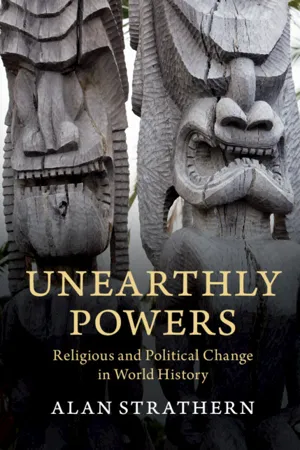
- English
- PDF
- Available on iOS & Android
About this book
Why was religion so important for rulers in the pre-modern world? And how did the world come to be dominated by just a handful of religious traditions, especially Christianity, Islam, and Buddhism? Drawing on sociology and anthropology, as well as a huge range of historical literature from all regions and periods of world history, Alan Strathern sets out a new way of thinking about transformations in the fundamental nature of religion and its interaction with political authority. His analysis distinguishes between two quite different forms of religiosity - immanentism, which focused on worldly assistance, and transcendentalism, which centred on salvation from the human condition - and shows how their interaction shaped the course of history. Taking examples drawn from Ancient Rome to the Incas or nineteenth-century Tahiti, a host of phenomena, including sacred kingship, millenarianism, state-church struggles, reformations, iconoclasm, and, above all, conversion are revealed in a new light.
Frequently asked questions
- Essential is ideal for learners and professionals who enjoy exploring a wide range of subjects. Access the Essential Library with 800,000+ trusted titles and best-sellers across business, personal growth, and the humanities. Includes unlimited reading time and Standard Read Aloud voice.
- Complete: Perfect for advanced learners and researchers needing full, unrestricted access. Unlock 1.4M+ books across hundreds of subjects, including academic and specialized titles. The Complete Plan also includes advanced features like Premium Read Aloud and Research Assistant.
Please note we cannot support devices running on iOS 13 and Android 7 or earlier. Learn more about using the app.
Information
Table of contents
- Cover
- Half-title
- Title page
- Copyright information
- Dedication
- Contents
- Figures
- Preface and Acknowledgements
- Introduction
- 1 The Two Forms of Religion: Being and Nothingness
- 2 Religion as the Fabric of the State
- 3 The Two Forms of Sacred Kingship: Divinisation and Righteousness
- 4 The Economy of Ritual Efficacy and the Empirical Reception of Christianity
- 5 The Conversion of Kings under the Conditions of Immanentism: Constantine to Cakobau
- 6 Dreams of State: Conversion as the Making of Kings and Subjects
- Conclusion
- Glossary of Theoretical Terms
- Bibliography
- Index